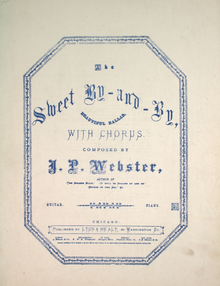In the Sweet By-and-By
| "The Sweet By-and-By" | |
|---|---|

Cover of original Lyon & Healy sheet music, 1868
|
|
| Hymn | |
| Published | 1868 |
| Composer(s) | Joseph P. Webster |
| Lyricist(s) | S. Fillmore Bennett |
"The Sweet By-and-By" is a Christian hymn with lyrics by S. Fillmore Bennett and music by Joseph P. Webster. It is recognizable by its chorus:
Bennett described the composition of the hymn in his autobiography.
Mr. Webster, like many musicians, was of an exceedingly nervous and sensitive nature, and subject to periods of depression, in which he looked upon the dark side of all things in life. I had learned his peculiarities so well that on meeting him I could tell at a glance if he was melancholy, and had found that I could rouse him up by giving him a new song to work on.
The hymn, immensely popular in the nineteenth century, became a Gospel standard and has appeared in hymnals ever since. In the New Orleans jazz tradition 'Sweet By-and-By' is a standard dirge played in so-called "jazz funerals". The American composer Charles Ives quoted the hymn in several works, most notably in the finale of his Orchestral Set No. 2, written between 1915 and 1919. Translations of the text exist in a number of world languages.
'Sweet By-and-By' continues to be regularly performed. Noteworthy recordings over the years have been made by Elvis Presley, Louis Armstrong, Johnny Cash, Glen Campbell, Dolly Parton, Willie Nelson and Loretta Lynn.
The hymn is also heard in films, including Sergeant York (1941), Benny and Joon and Django Unchained (2012).
The 1907 Spanish Latter-day Saint hymnal contained a similar song, titled "Hay un Mundo Feliz Más Allá" and set to the same tune modified by adding to all parts the notes of the traditional first response in the call-and-response division of the refrain. This hymn was copied with permission from the American Tract Society's Himnos evangélicos. During the era of the Mexican Revolution, Andrés C. Gonzalez, an early LDS missionary in Mexico, sang "Hay un mundo feliz más allá" in public and was arrested for "stealing" the Protestants' song. While incarcerated, he rewrote the lyrics, which appeased the police. This revised version appears in place of the original in every Spanish LDS hymnal from 1912 on. It was titled "Despedida" until the 1992 hymnal, which changed the title to match the first line of the song, "Placentero nos es trabajar".
...
Wikipedia
